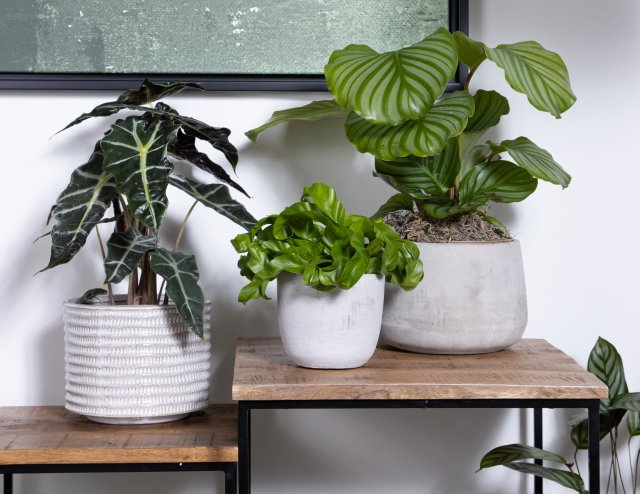
A Royer’s truck set out from Lebanon in early August on a 250-mile journey into the future of foliage plants.
The truck headed southwest on Interstate 81, its destination a 200-acre farm in the Blue Ridge Mountains of western Virginia, in the town of Stuarts Draft. On that farm lies a five-acre building that from above looks like nothing so much as a gigantic Lego piece (photo, below).
It’s a state-of-the art greenhouse where The Plant Co., which was birthed during the pandemic, is drawing on one family’s decades of floriculture experience and the latest technology in a quest to “reinvent the houseplant industry.”
The Royer’s truck returned from Stuarts Draft with 18 different plant varieties that retail for $15 to $50 each. Marketed under the “Proven Winners” brand, they’ve been an immediate hit with customers and employees alike, with many of them selling out.
Royer’s is the first florist to carry The Plant Co.’s products.
“It was amazing to see how many of our own people purchased the Proven Winners plants as soon as they came in,” said Cheryl Brill, chief operating officer.
CEO Tom Royer and Zach Barkman, wholesale manager, got to know The Plant Co. this spring when they attended the International Floriculture Expo in Fort Lauderdale, Fla. It was there that they met Jennifer Kuziw, The Plant Co.’s northeast sales manager.
Kuziw grew up and still lives in central Pennsylvania. She already was familiar with Royer’s and thought the two companies would be a good fit given their commitment to delivering high-quality products to customers.
Within weeks, she was showing product samples to Royer’s officials in Lebanon. Tom and Zach then visited the massive greenhouse in Virginia, which opened in 2020.
Tissue culture
“This is all great stuff,” Tom recalled upon seeing the plants.
Tom noted that in the past 30 years, mass marketers began offering foliage plants. Florida growers either catered to those customers, turning plants into mere commodities, or went out of business altogether.
The result was plants that weren’t as special as they once were. That left fertile ground for The Plant Co., the brainchild of founders and brothers-in-law Jason Van Wingerden and Frank Paul.
Just as four generations of Royers have made the family name synonymous with flower shops, the Van Wingerden family is deeply rooted in the greenhouse trade. It began with Aart and Cora Van Wingerden, who arrived from Holland in 1948 and started a greenhouse business in New Jersey, spawning many other similar enterprises.

Jason Van Wingerden, a grandson of Aart and Cora, worked at Green Circle Growers in Oberlin, Ohio, which Jason’s father started in 1968. Green Circle comprises 150 acres of indoor growing space, making it one of the largest greenhouses in the United States. Frank Paul was Green Circle’s former head grower of orchids.
The brothers-in-law settled on western Virginia for its climate, proximity to interstates 81 and 64, and high-quality well water, said Ben Wright, The Plant Co.’s national account manager.
The elevation in the Blue Ridge Mountains means warm days, cool nights and “good, consistent quality growth year-round,” Wright said.
The greenhouse (photo, above) is just a couple miles away from a Hershey Co. factory that makes Reese’s Peanut Butter Cups.
The Plant Co.’s products begin as tissue culture in test tubes, arriving from labs around the world, before they are rooted in soil in the greenhouse. Tissue culture makes the plants cleaner and less prone to disease.
Ease of care and use
The greenhouse’s 21-foot ceilings keep plants cooler, as do metal poles that are powder coated white to absorb less heat.
Thirteen layers of sand and gravel sit below capillary mats. Plants are watered from below through the mats, then the water drains back into holding tanks so it isn’t wasted.
Carbon dioxide from the greenhouse’s high-efficiency natural gas boilers is captured and pumped into the greenhouse to encourage plant growth.
The plants are promoted for their quality but also for their ease of care and use. The plants are sold with tags that include the variety name, genus and species and information about where to use them within a room and how to care for them.
The goal is to embolden consumers who haven’t had success with plants in the past.
“And so they kind of discover that green thumb,” Wright said.